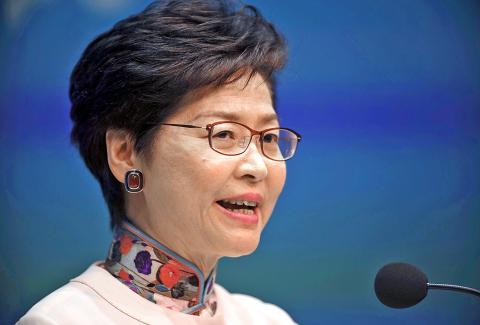Hong Kong is banning alternative smoking devices — the latest setback to the tobacco industry’s efforts to find growth markets as cigarette demand shrinks worldwide.
In a surprise reversal, the territory plans to impose a ban on e-cigarettes, a next-generation category of smokeless tobacco products, Hong Kong Chief Executive Carrie Lam (林鄭月娥) said in a policy address yesterday.
Hong Kong joins at least 27 nations that have banned next-generation smokeless devices, heeding advice from the WHO.

Photo: AP
The products have come under fire from health officials across the globe because of concerns about their appeal among young people.
The backlash is bad news for tobacco companies, which are investing billions of US dollars in developing products that could move the industry beyond cigarettes.
In its legislative proposal in June, the Hong Kong government had proposed only to regulate e-cigarettes the same way as conventional tobacco, including restricting their sale to minors and prohibiting advertisements and sponsorship.
Tobacco makers were looking to Hong Kong as a potential market for alternative devices.
A Philip Morris International Inc representative said it does not sell any of its new tobacco alternatives in Hong Kong, while Japan Tobacco Inc said it only sells paper cigarettes in the territory.
“A full ban of e-cigarettes will only make black market business more popular, not help to protect teenagers under 18 years old and consumers,” the Coalition on Tobacco Affairs said in a statement yesterday.
It added that none of its members are selling e-cigarettes or heat-not-burn devices in Hong Kong.
Japan Tobacco investors were unfazed by the news. Shares gained as much as 1.9 percent in Tokyo yesterday.
Philip Morris shares have tumbled about 27 percent from a peak in October last year.
The move comes as big tobacco companies have been increasingly pressured by tighter restrictions on smoking and the sale of cigarettes around the globe.
In the US, the largest market for e-cigarettes, regulators have taken a more severe stance on the devices after raising the alarms on their use by children and teenagers.
The US Food and Drug Administration said it is considering banning flavored versions of nicotine devices. Last month, it seized documents from Juul Labs Inc, which offers sleek e-cigarettes with flavors that appeal to underage users.
While some countries have taken a combative stance against e-cigarettes, others have looked to them as a way to curb smoking.
Regulators in several countries, including the UK and New Zealand, have backed the devices as potentially less risky compared with traditional cigarettes.
Hong Kong has one of the lowest smoking prevalence rates in the world, and about 10 percent of the population smokes, Bloomberg Intelligence data showed.

The US dollar was trading at NT$29.7 at 10am today on the Taipei Foreign Exchange, as the New Taiwan dollar gained NT$1.364 from the previous close last week. The NT dollar continued to rise today, after surging 3.07 percent on Friday. After opening at NT$30.91, the NT dollar gained more than NT$1 in just 15 minutes, briefly passing the NT$30 mark. Before the US Department of the Treasury's semi-annual currency report came out, expectations that the NT dollar would keep rising were already building. The NT dollar on Friday closed at NT$31.064, up by NT$0.953 — a 3.07 percent single-day gain. Today,

‘SHORT TERM’: The local currency would likely remain strong in the near term, driven by anticipated US trade pressure, capital inflows and expectations of a US Fed rate cut The US dollar is expected to fall below NT$30 in the near term, as traders anticipate increased pressure from Washington for Taiwan to allow the New Taiwan dollar to appreciate, Cathay United Bank (國泰世華銀行) chief economist Lin Chi-chao (林啟超) said. Following a sharp drop in the greenback against the NT dollar on Friday, Lin told the Central News Agency that the local currency is likely to remain strong in the short term, driven in part by market psychology surrounding anticipated US policy pressure. On Friday, the US dollar fell NT$0.953, or 3.07 percent, closing at NT$31.064 — its lowest level since Jan.

The New Taiwan dollar and Taiwanese stocks surged on signs that trade tensions between the world’s top two economies might start easing and as US tech earnings boosted the outlook of the nation’s semiconductor exports. The NT dollar strengthened as much as 3.8 percent versus the US dollar to 30.815, the biggest intraday gain since January 2011, closing at NT$31.064. The benchmark TAIEX jumped 2.73 percent to outperform the region’s equity gauges. Outlook for global trade improved after China said it is assessing possible trade talks with the US, providing a boost for the nation’s currency and shares. As the NT dollar

The Financial Supervisory Commission (FSC) yesterday met with some of the nation’s largest insurance companies as a skyrocketing New Taiwan dollar piles pressure on their hundreds of billions of dollars in US bond investments. The commission has asked some life insurance firms, among the biggest Asian holders of US debt, to discuss how the rapidly strengthening NT dollar has impacted their operations, people familiar with the matter said. The meeting took place as the NT dollar jumped as much as 5 percent yesterday, its biggest intraday gain in more than three decades. The local currency surged as exporters rushed to